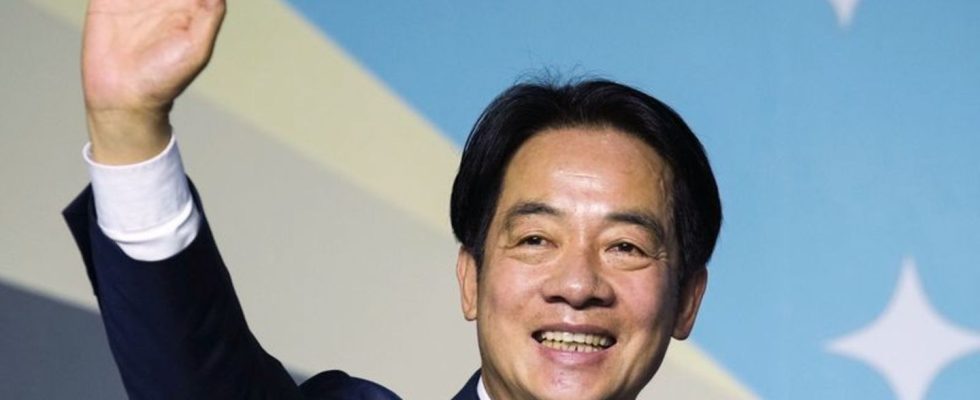Choose
Taiwan elects China critic as president
William Lai won 40.05 percent of the vote in Taiwan’s presidential election. photo
© –/kyodo/dpa
Taiwanese voters gave Beijing a lesson. The Progressive Party, which distances itself from China, will continue to be the president. Beijing doesn’t like the result of the election at all.
After the election victory of William Lai from the China-critical Progress Party Taiwan is threatened with new tensions with its powerful neighbor China. Voters helped the party to a historic third term in government and voted for the status quo in strained relations with the communist leadership. The previous vice president, Lai, won 40 percent of the vote. However, his party lost an absolute majority in parliament, which will make his government’s work more difficult. The USA, Germany and other countries congratulated the 64-year-old. Sharp tones came from Beijing against the Progressive Party and the USA.
At 72 percent of the 19.5 million eligible voters, turnout in Saturday’s election was slightly lower than in 2020. Despite the heated election campaign, Lai’s opponents were unable to keep up. Hou Yu-ih of the China-friendly Kuomintang (KMT) received around 33 percent of the vote. Ko Wen-je of the populist Taiwan People’s Party (TPP) ended up with around 26 percent. The Democratic Progressive Party (DPP) is the first party in Taiwan to win three consecutive presidential elections. Lai’s predecessor Tsai Ing-wen was not allowed to run again after two terms in office.
Beijing reacts angrily
“We are telling the international community that between democracy and authoritarianism, we stand on the side of democracy,” Lai said on Saturday evening in Taipei – a clear signal to China. The tense relationship with Beijing was a dominant election campaign issue in the country with more than 23 million inhabitants. The Communist Party counts Taiwan as part of China’s territory, even though it has never governed the island in the Indo-Pacific and Taiwan has had an independent, democratically elected government for decades. Lai called on China to maintain peace in the Taiwan Strait, the strait between the two countries that is important for global shipping. He also expressed his willingness to cooperate.
Beijing responded with sharp criticism: There is only one China in the world and Taiwan is part of China, it said. Taiwan Affairs Office spokesman Chen Binhua said the election results in Taiwan show that the Progressive Party does not represent the majority of prevailing public opinion. China will oppose “separatist actions towards independence for Taiwan.” The Progressive Party in particular is a thorn in the side of the CP. The party stands for independence for Taiwan, which is a red flag for Beijing. If the island were to formally declare this, China would probably escalate the situation in the Taiwan Strait. However, Lai does not consider such an explanation.
Status quo versus the one-China principle
When it comes to China, Taiwan often talks about the status quo. What is meant is that the People’s Republic of China and the Republic of China, as Taiwan is still officially called today, do not belong together – and live in peaceful coexistence. Beijing, on the other hand, has historically invoked a one-China principle. In 1992, both sides also acknowledged that there is only one China, but without defining it in more detail. According to its one-China doctrine, Beijing does not allow its diplomatic partners to maintain official relations with Taiwan. For fear of pressure from Beijing, only a few smaller states recognize the island republic diplomatically.
Beijing also reacted angrily to Washington’s declaration of the election. The US violated its own commitment to only maintain cultural and trade relations or other unofficial exchanges with Taiwan, the Foreign Ministry said. This sends “a wrong signal to the separatist forces” in Taiwan. The Taiwan issue is at the center of China’s core interests and represents the “first red line” that must not be crossed in US-China relations.
Germany is also sending congratulations on the election
As Taiwan’s ally and supporter in the event of conflict, the US congratulated the new president and said it looked forward to working with Lai. However, President Joe Biden emphasized that he does not support Taiwan independence. An informal US delegation led by former National Security Advisor Stephen Hadley and former Deputy Secretary of State James Steinberg was expected in Taiwan on Sunday.
The federal government announced that Germany would like to expand relations with Taipei. This should be done in accordance with Germany’s one-China policy, said a spokesman for the Foreign Office in Berlin. “The free and peaceful elections in Taiwan have once again shown how deeply rooted democracy is in Taiwan and how connected voters are to democratic values.” Germany maintains close and good relations with Taiwan in many areas. “Peace and stability in the Taiwan Strait is critical to the region and far beyond.”
What’s next for Taiwan?
Observers do not expect a war in the Taiwan Strait. But Helena Legarda, an expert on foreign and security policy at the Merics China Institute in Berlin, expects a reaction from China. “Lai’s victory will increase tensions across the Taiwan Strait, and there is an expectation that Beijing will respond by increasing pressure on Taiwan.” Military exercises or coercive trade policy measures are possible. Taiwan is counting on deterring China through armament. This year, the country, which sources its weapons and armaments from the USA, among others, is investing a record sum in its defense.
Expert Chen Ming-chi from Taiwan’s National Tsinghua University expects that exchanges with Germany will intensify. The new administration will seek to forge stronger and better relations with important European countries such as Germany. He sees parliamentary exchange or economic relations as possibilities. Chen referred to the announced investment by semiconductor specialist TSMC in Dresden. The Taiwanese company produces important parts for smartphones.

